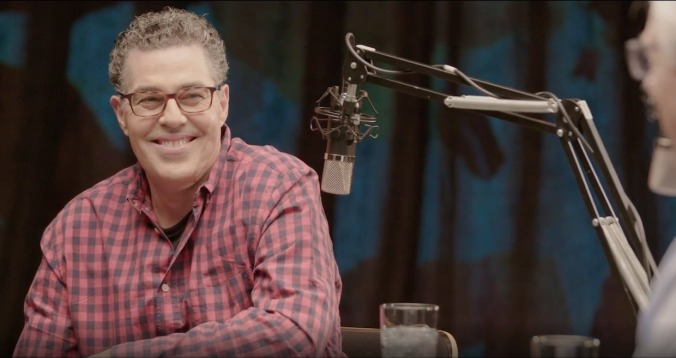“He comes from college and knowledge, I come from tomfoolery and sports.” That’s how Adam Carolla, of Loveline and The Man Show fame, describes his alliance with Dennis Prager, a conservative talk show host and commenter whose social views on nearly everything are reprehensible. No Safe Spaces, the duo’s new movie, refurbishes the Sundance-friendly cliché of the “unlikely friendship” for the purposes of propaganda against the SJWs and snowflakes making it impossible for conservative ideas to flourish on campus, thereby restricting Tim Allen’s right to speak comic truth to power. Prager, whose views regularly align with those of the religious right (Carolla’s basically a libertarian atheist), has experience with the matter. As he explains, one of his appearances was picketed with charges of homophobia, racism, anti-Semitism, and more. But because he’s Jewish, he’s able to chucklingly explain that the last charge didn’t stick—especially after he got a friend of his, “a well-known Jew” (great phrasing!), to vouch for him. With one charge dismissed, all the other descriptors must be equally invalid. (They aren’t.)
Before hitting the road in segments documenting a speaking tour they conducted to espouse the meaningless canard of “common sense values,” Carolla and Prager get flashback establishing stories. For Carolla, it’s goofy re-enactments of learning his mom was a welfare queen at an early age. (He was redpilled into common sense as an teenager—bait for the MRA crowd). Meanwhile, young Prager is shown in the USSR, singing cantors’ songs in his bugged apartment to confound the anti-Semitic police. Since Carolla knows welfare entitlement from the inside and Prager understands suppression of free speech, they’re a libertarian alliance that can synthesize those two POVs into larger conspiratorial mutterings. All this grounding in bizarre “humanizing” backstories is reminiscent of similar opening sequences in Dinesh D’Souza’s conservative documentary tetralogy; D’Souza’s frequent collaborator John D. Sullivan has a story credit here. Per current mainstream documentary practices, there are multiple arcs to be resolved at the end: Will Ben Shapiro get to speak at Berkeley? Will Prager get to serve as the guest conductor of the Santa Monica Orchestra at a fundraiser, or will protests deny him the opportunity?
Both Shapiro and Prager won out, undermining the narrative of the sinister suppression of conservative speech. But even broadly speaking, this is an exceedingly difficult case to credibly make when the president is tweeting out Breitbart links. With regards to colleges, the protest is that students are supposed to be intellectually challenged by ideas, objectionable and otherwise, they’d otherwise never encounter. Given that this stuff is everywhere, it’s a weak argument—the marketplace of ideas is sorting itself out, just not in the direction Prager and Carolla would like. In between “satirical” palate cleanser interludes (e.g. the opening credits for a fictional SJW superhero cartoon with the tagline “Get triggered!”), interviews are conducted with subjects who claim their free-speech was suppressed. These all fail to pass the smell test for various reasons, like omitting what would seem to be crucial specifics. Take a segment on a Berkeley student who abstained from voting on a student senate bill because of her “Christian values” and was subsequently disaffiliated from all her student groups. The film doesn’t mention what that bill was—a statement in favor of trans rights—keeping things deliberately vague lest that raise any viewer objection. Googling any of these interviewees demonstrates that they’ve raised their conservative media profiles since the incident that supposedly cancelled them, with talking-head appearances and speaking gigs following.
This is “debate me, you coward” in movie form, climaxing with Prager marching onto a black college campus, finding a group of young men and immediately grilling them about whether they support hate speech’s right to exist. They’re all polite and engage, until matters devolve into Prager asking whether they think racism still shapes their lives—the answer, unsurprisingly, is yes, which he doesn’t like. The scene is supposed to demonstrate one thing (free, vigorous, and mutually respectful dialogue) while showing something that’s actually entirely different: a belligerent white man demanding answers that sync with his own, barking at strangers in a way that only gets more ghastly and boorish the longer it goes along.
No Safe Spaces caters to its intended viewers’ least savory biases, making sure all student activists shown fit into particular categories—overweight, gay, or simply “angry and black”—that stoke the resentment of the target demographic. The structuring absence is Donald Trump, whose name is only dropped once. If, as a profile once speculated, Prager’s online video explainer outlet Prager University doesn’t explicitly endorse Trump, that’s probably in part to retain its nonprofit tax status. Here, going full MAGA might undermine the ostensible project of bipartisan defense of “free speech,” whose suppression is described as one of the most important issues in the United States today. Still, it’s hard to deny who the likely viewers are going to be, given the roster of those appearing (Allen, Shapiro, Charlie Kirk, Candace Owens)—and that’s before Alan Dershowitz shows up to declare “If you want to feel good, get a massage.” This isn’t an argument for free speech, it’s just paranoid whining, complete with a roundtable of comics sympathetically agreeing how sad and scary this all is, plus images of the Statue of Liberty with tape over its mouth.









































